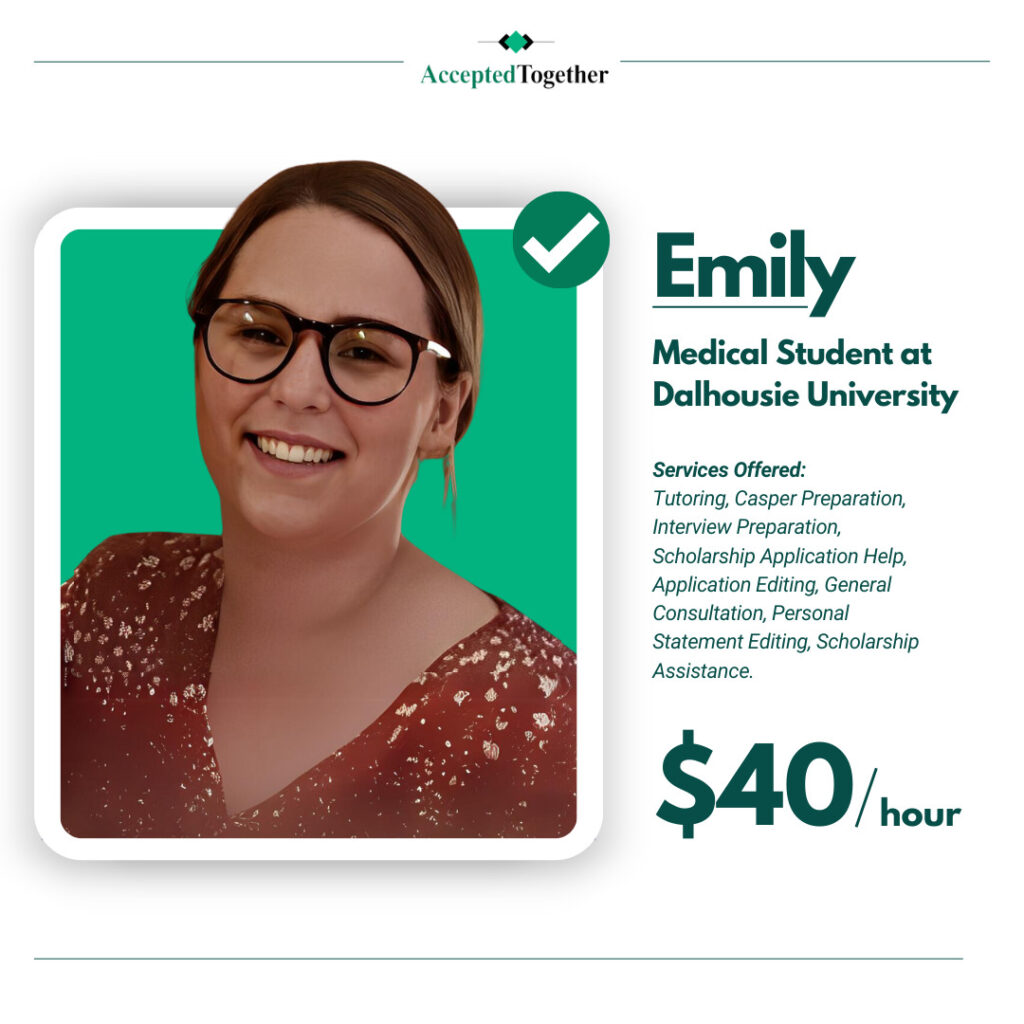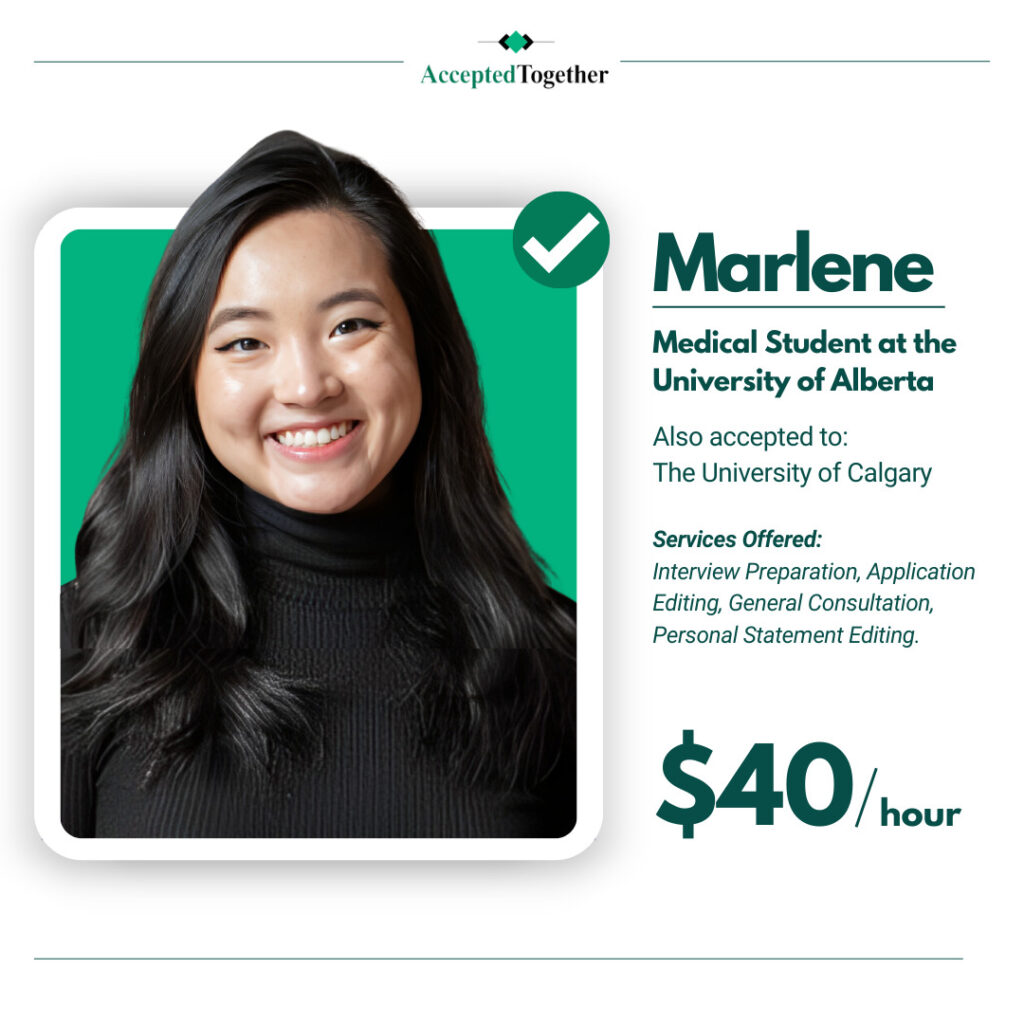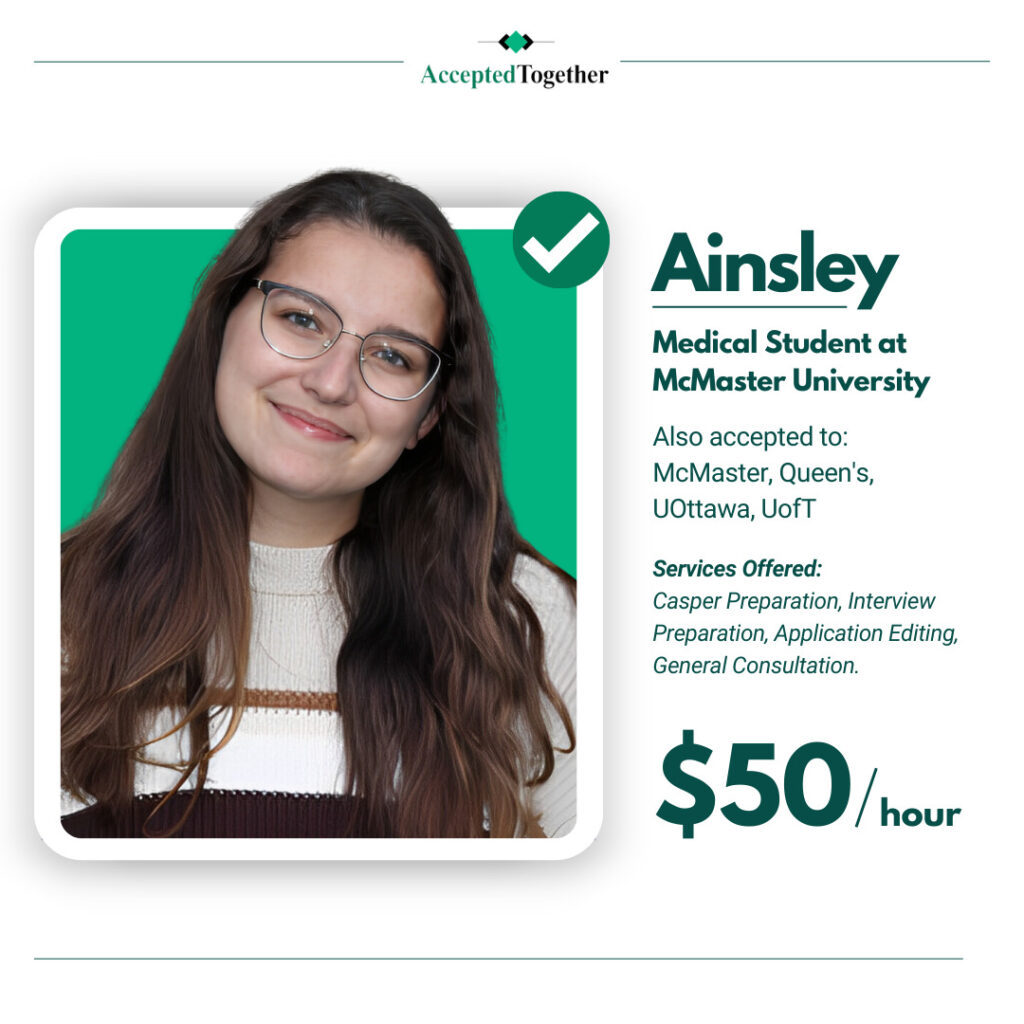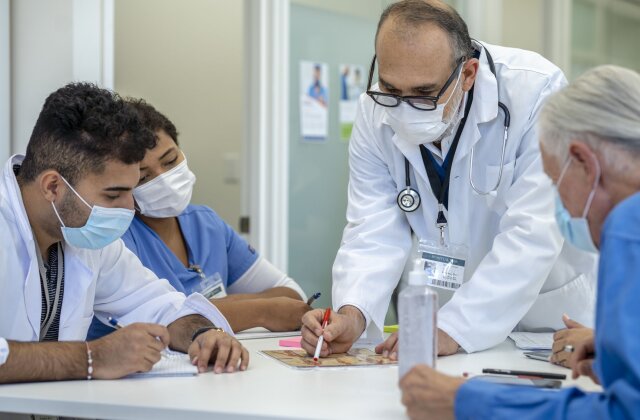
Table of Contents
Click to see hundreds of consultants who can mentor you:


Question 1: How have your lived experiences contributed to your personal growth and desire to pursue a career in medicine?
- Be authentic by sharing a compelling narrative:
- Tell a personal story: Reviewers at TMU School of Medicine appreciate stories, as they bring to life your journey in a way that facts alone can’t. Did a personal experience with illness, caregiving, or a community role inspire you to pursue medicine? Frame your response as a story—one that shows your humanity and passion. For instance, if caring for an ill family member opened your eyes to healthcare inequities, describe the emotions, challenges, and growth you experienced.
- Use initials to respect confidentiality: When referring to specific individuals in your story (e.g., a patient, family member, or mentor), use just a single letter to protect their identity. For example, “I remember taking care of my uncle, R, when he was diagnosed with a chronic illness. Watching R’s struggles with accessing quality care, I realized the gaps in the system and how it affected people like him.” This small touch shows respect for confidentiality, an important value in healthcare.
- Highlight personal transformation: This is your chance to show how these experiences have transformed you. Talk about the resilience, maturity, or empathy you gained. For example, if you worked as a volunteer in a low-income community clinic, don’t just state your role—paint a picture of how the people you met shaped your understanding of healthcare. “Working with M, a woman who had been navigating the healthcare system alone, taught me not only the importance of access to care but also how critical emotional support is to a patient’s journey.”
- Demonstrate emotional intelligence: Make it clear that these experiences have allowed you to develop emotional intelligence—whether it’s patience, empathy, or the ability to stay calm under pressure. These are qualities that TMU surely values in future healthcare providers.
- Find the balance: While it’s important to reflect on how your experiences align with TMU School of Medicine’s mission of equity and inclusion, avoid being too heavy-handed in linking your story to their values. Instead of explicitly stating, “This is why I align with TMU’s mission,” let your experiences naturally demonstrate your commitment to these principles. For instance, if you’ve faced or witnessed health disparities, describe how those moments made you want to advocate for marginalized groups. “After seeing B, a friend from an immigrant family, struggle to find culturally competent mental health care, I realized that addressing healthcare inequities would be at the heart of my work as a physician.”
- Subtle reflection: By describing your lived experiences and the insights they’ve given you about healthcare inequities, your alignment with TMU’s mission will come across implicitly. For example, instead of directly stating that you are committed to reconciliation, you might describe a time when you worked with Indigenous communities and how that deepened your understanding of the historical context that continues to affect their health outcomes.
- Describe how adversity shaped you: Whether it’s overcoming personal health challenges, witnessing family members navigate the healthcare system, or supporting marginalized communities, make sure to explain how these challenges shaped you. For example, if you faced adversity yourself, talk about how it made you more compassionate and determined to ensure others don’t face the same struggles.
- Use setbacks as growth opportunities: Based on their mission statement, the TMU School of Medicine appreciates resilience. If you’ve experienced setbacks—whether academic, personal, or professional—discuss how they’ve helped you grow. Did a gap year spent volunteering in underserved areas redefine your understanding of patient care? Did overcoming a personal obstacle strengthen your resolve to serve others?
Question 2: What leadership roles and/or community engagement experiences have you undertaken within your community, particularly in efforts aimed at supporting and advocating for marginalized groups? How have these experiences prepared you to address the needs of underserved communities as a future healthcare professional?

- Highlight leadership with measurable impact:
- Specific leadership examples: Instead of simply stating that you held leadership roles, focus on quantifiable results. For example, did you organize a mental health awareness campaign in an underserved community that resulted in 300 attendees and a 20% increase in local resource usage? Did you spearhead a COVID-19 vaccine drive in marginalized areas that led to a significant uptick in vaccinations?
- Overcome barriers: Talk about challenges you faced in your leadership roles and how you overcame them, especially when dealing with systemic issues like mistrust in healthcare. For instance, if you led an initiative aimed at providing healthcare information to immigrant communities, explain how you adjusted your communication strategies to ensure the message resonated with different cultural groups.
- Connect leadership to advocacy: Leadership roles that involve directly addressing barriers faced by marginalized groups will resonate strongly with TMU School of Medicine. For example, if you volunteered at a homeless shelter and noticed a gap in mental health services, describe how you took the initiative to start a mental health screening program. Highlight your advocacy by detailing how you worked to address social determinants of health, such as poverty, housing, or discrimination.
- Narrative of action: Frame your leadership role as not just a position, but as a story of proactive change. Describe how you identified an issue (e.g., lack of accessible health services for Indigenous communities) and mobilized resources or influenced policy within your organization or community to create a lasting solution.
- Deep involvement, not surface participation: TMU would certainly value applicants who have invested significant time and effort in long-term community work, especially with marginalized groups. Rather than mentioning a brief volunteer stint, discuss sustained engagement. For example, if you’ve been working with a youth mentorship program for years, describe how you’ve watched mentees grow and how you’ve adapted the program to better address their evolving needs.
- Initiate and sustain change: Discuss any long-term projects where you initiated a new approach or service. Did you start a tutoring program for low-income students that’s still running after you left, or did you help reform a healthcare program at your university to be more inclusive? This shows your ability to implement sustainable change, which aligns with the TMU School of Medicine’s commitment to addressing systemic health issues.
- Transferrable skills: Discuss the specific skills you’ve gained from your leadership and community work that are directly transferrable to being a physician. For example, highlight how organizing a large-scale community health fair improved your project management and collaboration skills—essential for running interdisciplinary healthcare teams. Or, mention how mentoring underserved youth sharpened your ability to communicate complex ideas in a simple, culturally sensitive way, a vital skill in patient care.
- Address future inequities: Reflect on how your experiences in community advocacy will help you address future health inequities as a physician. If you’ve worked with marginalized populations, explain how this has given you the empathy and insight necessary to treat patients who may have been historically underserved or distrustful of the medical system. TMU wants to see that your commitment to equity will continue into your medical career.
Question 3: How have your personal, professional, or extracurricular experiences with diversity, inequity, and/or marginalization influenced your efforts to create a more inclusive environment in your school, community, or workplace?

- Witness and address healthcare inequities: Discuss specific instances where you’ve encountered inequities, whether it’s witnessing discrimination in healthcare or being part of a marginalized group yourself. For example, if you saw how language barriers affected immigrant patients’ access to healthcare, describe how this moment impacted you. “While working at a community health clinic, I saw firsthand how J, an elderly immigrant, struggled to communicate with her physician due to a language barrier. This experience motivated me to get involved in a project that provided translation services to bridge the gap between patients and providers.”
- Active involvement: Any medical school, including TMU School of Medicine, wants to see that you are someone who takes action. Did you lead an initiative, volunteer for an organization, or advocate for changes that addressed these inequities? For instance, if you noticed disparities in mental health care for marginalized students at your university, talk about how you spearheaded a mental health awareness campaign. The key is to show how these experiences moved you from observation to action.
- Personal encounters with inequity: If you’ve personally experienced inequity or marginalization, whether due to race, gender, socioeconomic status, or other factors, reflect on how this has shaped your desire to create change. For example, if you faced discrimination in an academic setting, you might describe how this inspired you to push for policy changes that ensure future students have a more inclusive experience. “As someone who faced financial barriers during my studies, I advocated for the creation of a financial aid program for low-income students, ensuring others wouldn’t have to face the same challenges.”
- Initiatives with measurable outcomes: Provide specific examples of how you actively contributed to creating a more inclusive environment. Did you lead diversity and inclusion workshops, start a program to support marginalized students, or work on a healthcare project aimed at underserved populations? TMU School of Medicine is looking for candidates who have created real, measurable change. For example, “After noticing the lack of accessible healthcare information for Indigenous communities, I led a project to develop culturally sensitive health education materials in partnership with local Indigenous leaders.”
- Address systemic barriers: Go beyond surface-level contributions. If you’ve worked on addressing systemic barriers—such as policies or practices that disproportionately affect marginalized groups—describe your role in creating change. For example, “As a member of my university’s student council, I advocated for policy reforms that increased the representation of women and minorities in leadership roles, ensuring that decision-making reflected the diverse needs of the student body.”
- Innovative approaches: If you’ve taken an innovative approach to creating change, highlight it. Medical schools like TMU value candidates who think outside the box to address inequities. For example, if you implemented a mentorship program pairing professionals from underrepresented backgrounds with students interested in healthcare, explain how this initiative fostered diversity in the field.
- Real contributions to equity and inclusion: TMU School of Medicine would want to see that your efforts had a tangible impact. Rather than simply stating what you did, show how it made a difference. Did your program increase participation from underrepresented groups? Did it lead to a policy change that made your workplace more inclusive? For example, “The diversity workshops I led resulted in a 30% increase in participation from minority students in campus leadership roles, fostering a more inclusive and representative student government.”
- Storytelling through impact: Use specific stories to illustrate the impact of your actions. “After starting an initiative to provide mental health support to LGBTQ+ students, I saw how M, a first-year student, gained the confidence to openly seek therapy for the first time. M later became an advocate for expanding these services, showing how a single initiative can create a ripple effect.”
- Sustained impact: Where possible, highlight how the changes you initiated have had long-term effects. Medical schools like TMU value applicants who are not just focused on temporary fixes but on sustaining improvements over time. If you started a program or initiative, is it still running today? For example, “The mentorship program I launched for underrepresented students has continued to grow, now including over 50 mentors and mentees annually, ensuring a pipeline of diverse leaders in healthcare.”
Question 4: Describe your connection(s) to the Brampton/Peel Region and surrounding communities and/or your interest in practicing in culturally diverse communities such as these, that represent the future of Canada.

- Highlight connections to the Brampton/Peel Region:
- Personal or professional connections: If you have lived, studied, worked, or volunteered in the Brampton/Peel Region or nearby areas, mention specific examples of how those experiences shaped your interest in healthcare. For example, if you’ve volunteered in a health clinic in Brampton or have family ties in Mississauga, explain how this exposure to the community’s diversity and healthcare challenges has informed your perspective. “Growing up in Brampton, I saw firsthand how healthcare disparities affected my neighbors. Many struggled to access culturally competent care, particularly within immigrant and underserved populations. This motivated me to pursue medicine to address these gaps.”
- Contextualize your connection: Go beyond stating that you have a connection—explain how it has shaped your view of healthcare. For instance, if you participated in community health initiatives in the region, discuss how working with patients from a wide variety of backgrounds deepened your understanding of their specific health needs and barriers to care. “During my internship at a healthcare center in Peel, I worked closely with patients who had recently immigrated to Canada and struggled with navigating the healthcare system due to language barriers. These experiences highlighted for me the importance of healthcare that considers cultural backgrounds and individual needs.”
- Passion for serving culturally diverse populations: If you don’t have direct ties to the Brampton/Peel Region, emphasize your interest in working with culturally diverse communities like these. TMU values candidates who are drawn to the idea of practicing in regions where they can make an impact on underserved populations. For example, “Although I do not have direct connections to the Brampton/Peel Region, my work with diverse immigrant populations in [city] has developed my passion for serving communities with a rich cultural landscape. I am particularly drawn to the challenges and rewards of providing care to a population as dynamic and diverse as Peel.”
- Show your understanding of the unique healthcare needs: Research and discuss the specific healthcare challenges that these communities face, such as the needs of new immigrants, healthcare disparities related to socioeconomic status, or language and cultural barriers. TMU wants to see that you are not just interested in diversity for diversity’s sake but that you understand the specific healthcare challenges in these communities. “I understand that Brampton, as one of Canada’s fastest-growing and most diverse cities, faces unique healthcare challenges, from providing culturally sensitive care to addressing higher rates of chronic diseases in certain populations. These are issues I’m passionate about tackling as a future physician.”
- Reflect on your future role in the community: If you envision yourself practicing medicine in the Brampton/Peel Region or similar culturally diverse communities, describe how your experiences have prepared you to address local healthcare needs. Highlight how your skills, background, or community work align with TMU School of Medicine’s focus on serving underserved populations. For instance, “Through my experience working in multicultural clinics, I’ve developed the ability to approach healthcare holistically, taking into account cultural beliefs and values. I’m committed to bringing this culturally competent approach to Brampton, where the diversity of the population requires healthcare providers to be adaptable and sensitive to the unique needs of each patient.”
- Emphasize a long-term commitment: Show that you’re not just interested in short-term work, but are dedicated to long-term healthcare solutions in these communities. Discuss how you plan to continue advocating for or contributing to healthcare improvements throughout your medical career. “I am eager to work in the Brampton/Peel Region not only as a healthcare provider but also as a community advocate, addressing systemic barriers that affect healthcare access. I envision contributing to long-term solutions, such as developing community outreach programs and advocating for policy changes that address the social determinants of health.”
Click to see hundreds of consultants who can mentor you:


Final Thoughts: Aligning with TMU’s Mission
- Be reflective: Show how your experiences, both personal and professional, align with TMU School of Medicine’s goals of equity, diversity, inclusion, and reconciliation.
- Be specific: Use detailed examples that illustrate your commitment to these values. Vague answers won’t stand out—be clear about your contributions and growth.
- Show ongoing commitment: TMU School of Medicine is looking for applicants who are constantly evolving. Make sure your responses reflect a continuous commitment to improving healthcare access and equity.






